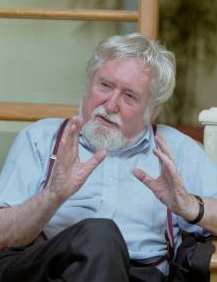Clifford Geertz
From Geography
Clifford Geertz (1926-2006) was an American anthropologist who is best known for his work on symbolic and interpretative anthropology (Geertz, 1973). He was born in San Francisco, California and after serving in the U.S. Navy in World War II he received his B.A. in philosophy from the Antioch College in 1950 after which he studied Social Anthropology at the Harvard University where he received his PhD in 1956. In his life he received Honorary Doctorate Degrees from some fifteen colleges and universities.
Symbolic anthropology
Geertz's best known work is 'The interpretation of Cultures' in which symbolic anthropology is central. This symbolic (or interpretative) anthropology is a framework which gives prime attention to the role of symbols in constructing public meaning (Geertz, 1973). His approach to culture is basically 'semiotic' (meaning the study of signs and symbols) in regarding culture as 'a series of signs and symbols which convey meaning' (Jackson and Smith, 1984). By signs and symbols he meant 'the things done, the gestures, the artistic products and so on' (Cloke et al., 1991, p. 90).
Geertz imagines culture acting as the 'glue' of locally established meaning and knowledge through which particular people in particular places 'make' and 'remake' their lives, but the the crucial inflection that 'Geertzian anthropology' introduces is the notion that these meanings and knowledges are themselves born upon, are in a sense indistinguishable from the manner in which they are spoken, 'talked', written, drawn, danced or otherwise communicated (Cloke et al., 1991). Therefore, he insisted that attention should be paid to the detailed geography of intersubjective (there is intersubjectivity between people if they agree on a given set of meanings or a definition of the situation) communication, and thereby to discover the myriad connections running between 'what things are said', 'how things are said' and the people- and place-specific contexts in which they get said (Cloke et al., 1991).
Geertz pictures anthropology as a complex intellectual activity involving the researcher in time-consuming and often heart-breaking ethnographic inquiry 'in the field' and then involving attempts to understand and to represent the worlds of these peoples in terms as faithful as possible to their own interpretations (Geertz, 1973). In his life he performed different of such time-consuming, fieldwork based researches in different parts of the world, including Southeast Asia and Northern Africa.
References
- Cloke, P., Philo, Ch. & Sadler, D. (1991). Approaching Human Geography. Chapman, London.
- Geertz, C. (1973). Thick Description: Toward an Interpretive Theory of Culture. In The Interpretation of Cultures: Selected Essays. Clifford Geertz. pp 3–30. New York: Basic Books
- Jackson, P. & Smith, S.J. (1984). Exploring Social Geography. Boston, London.
Contributors
- Page created by Lars-Olof Haverkort --LarsHaverkort 16:14, 8 September 2012 (CEST)
- Picture added by Anne van Strien
